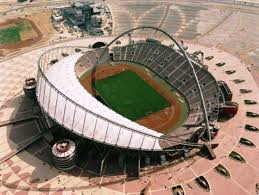By Paul Nicholson
April 1 – Qatar 2022 World Cup organisers have issued a strong rebuttal of the Amnesty International report accusing Qatar of using forced labour to renovate the Khalifa International Stadium and rejected any talk of it not being fit for World Cup purpose.
Qatar’s Supreme Committee for Delivery & Legacy (SC) “the tone of Amnesty International’s latest assertions paint a misleading picture and do nothing to contribute to our efforts.”
Amnesty International said staff of one labour supply company used the threat of withholding pay, handing workers over to the police or taking away their passports to stop them from leaving Qatar. Amnesty also said living conditions were still squalid and questioned whether the changes in Qatar’s labour laws would make any difference at all.
Amnesty also accused FIFA of doing nothing to improve the situation. FIFA’s head of sustainability, Federico Addiechi, countered this saying the measures taken by the committee “have already improved the situation for migrant workers”.
The response from Qatar was detailed saying that “the investigation was limited to just four companies out of more than 40 currently engaged on Khalifa International Stadium – Eversendai, Seven Hills, Blue Bay and Nakheel Landscapes. The conditions reported were not representative of the entire work force on Khalifa.”
The Amnesty investigation interviewed 231 mostly South Asian migrants – 132 working at the Khalifa International stadium and 99 on green spaces in the surrounding Aspire sports complex. But a Qatar statement raised questions over the timing of when the investigation was made (first half of 2015), saying that many of the conditions reported have already been acted upon.
“We acknowledge that Amnesty identified challenges in worker conditions existing during early 2015. But as the result of the Supreme Committee’s continued enforcement and monitoring efforts, many of the issues raised had been addressed by June of 2015, months before the publication of Amnesty’s report.
“In June 2015 – seven months before Amnesty contacted us – Nakheel Landscapes had undergone a comprehensive rectification process, and are one of the most compliant companies on site. Eversendai, although having gone through a significant rectification process, have been banned from subsequent FIFA World Cup projects until they can demonstrate sustainable improvements.
“Seven Hills and Blue Bay have not worked on FIFA World Cup Projects since June 2015 and are no longer eligible to work on future projects, until they demonstrate they are compliant with our Workers’ Welfare Standards.”
The Qataris did say they would investigate the allegations and was adamant that the 2022 World Cup “will act as a catalyst for change – it will not be built on the back of exploited workers. We wholly reject any notion that Qatar is unfit to host the FIFA World Cup.”
What is not said in the statements but what is becoming increasingly clear as being at stake is not just a change in Qatari labour laws, but a change in understanding of the region and its cultures that a World Cup brings.
Construction on World Cup projects in Qatar is expected to peak in the middle of 2017 and pressure is being put on organisers with this date in mind.
For their parts both FIFA and the Qataris are aware of and accepting the challenges. Hassan al-Thawadi, Secretary General for Qatar’s Supreme Committee for Delivery and Legacy, told the BBC: “We cannot resolve everything overnight…Progress has been made on the ground in relation to a number of these issues. In addition, I think the report indicates the commitment the Supreme Committee has made in relation to workers’ welfare and our standards, as well as the openness and transparency with which we have dealt with these matters.”
Contact the writer of this story at moc.l1714639303labto1714639303ofdlr1714639303owedi1714639303sni@n1714639303osloh1714639303cin.l1714639303uap1714639303

